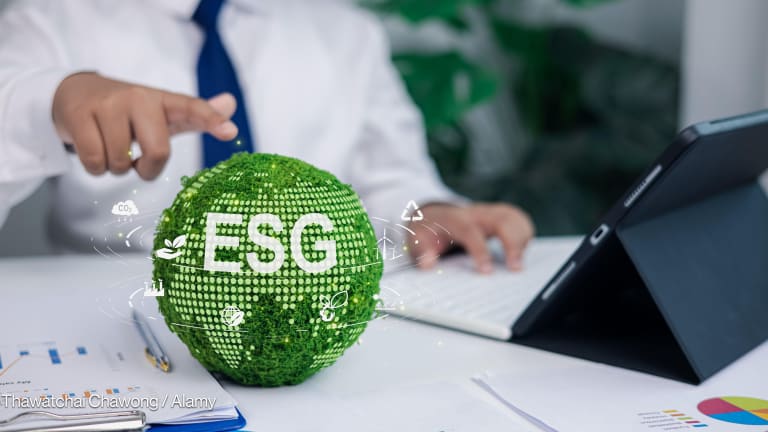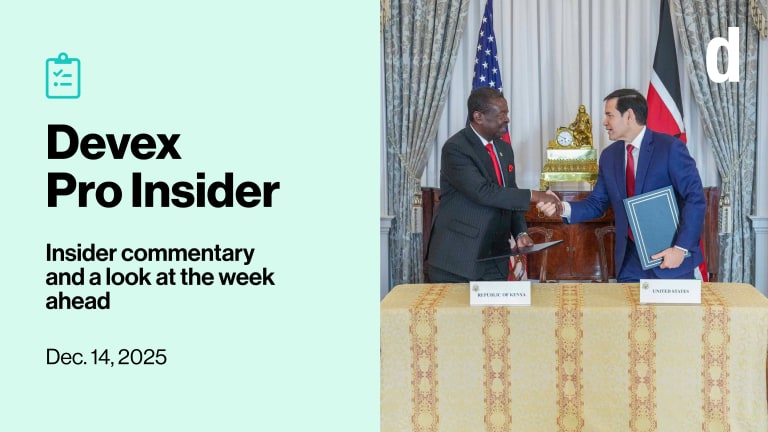An inside look at the UN Global Compact's new strategy
UN Global Compact chief Sanda Ojiambo lays out the initiative's new strategy and the corporate sustainability trends she's watching.
The largest corporate sustainability initiative in the world has launched a new strategy, aiming to help companies prioritize their actions to support achieving the Sustainable Development Goals and strengthen its accountability mechanisms after years of criticism. The UN Global Compact, which launched in 2000, has a new direction, and its new leader, Sanda Ojiambo — now officially a year into the job — is looking to help companies navigate a changing world in the wake of the COVID-19 pandemic. “It is unfortunate that it did take the pandemic perhaps to raise this awareness around the issues,” Ojiambo told Devex in an interview. “But I think what is really interesting is that the key issues that have come to the fore, for example, realizing the fragility of supply chains, realizing the fragility of the [small and medium-sized enterprise] sector, realizing the fragility of a social safety net ... does create a platform to move forward on a lot of these key issues that are also key to our strategy as a whole.” Ojiambo is the first African CEO and executive director at the Global Compact and the first with a development background. She was previously head of sustainable business and social impact at Safaricom. She had also worked for CARE International and the U.N. Development Programme in Somalia, in addition to the International Planned Parenthood Federation’s Africa region. The Global Compact held its annual summit last week, and Devex spoke with Ojiambo about the strategy and the sustainability trends she’s watching. “We challenged a lot of the orthodoxies or the stereotypes about how business can work and how quickly businesses can shift their configurations.” --— Sanda Ojiambo, CEO and executive director, UN Global Compact Five focus areas The new strategy has five focus areas: accountability, balanced growth, prioritization of SDGs and the 10 Global Compact principles — a tailored strategy for small and medium-sized enterprises, and strengthening the Global Compact’s relationship with the U.N. system. After a consultative process, the strategy came about designed to “get a view of what the future would look like for business,” Ojiambo told Devex. The first of those priorities is accountability, despite Global Compact being a voluntary membership organization. The goal is to make membership a symbol of a company’s progress on corporate sustainability. “You just become a stronger, more resilient business that is more responsive to business and global challenges,” she said. The Global Compact intends to do so in part by capitalizing on what surveys show is an increase in public trust in businesses, along with a desire by businesses to be more transparent about their actions and how they interact with consumers and society, she said. Businesses also increasingly face external pressure, and there is a growing sense that “good businesses are transparent … they are accountable to the customer, accountable to the citizenry,” she said. Some might consider that a generous characterization of business, but Ojiambo said Global Compact would make internal changes to improve its reporting process and monitor companies more closely. It is updating its reporting framework, called the communication on progress, and hopes to have it up and running by September, she said. It will also digitize the reporting platform so companies can benchmark themselves against others, look at best practices, and learn over time. It will be the only digitized publicly open and transparent reporting platform on sustainability efforts, Ojiambo said. “Reporting actually has inherent value. First, it allows us to demonstrate movement ... It's how we as responsible businesses are shaping the world agenda,” Ojiambo said. Global Compact is also strengthening its monitoring and evaluation functions, including bringing on more staff to look more closely at progress beyond just relying on the self-reporting of member businesses. The work is already underway, and the team should be fully staffed by the end of the year, she said. Beyond accountability, Global Compact is looking to grow, specifically by focusing on areas where it doesn’t have many corporate members but has potential — including in the U.S., China, and in countries across Africa, Asia, and Latin America, where fewer companies have joined. The organization will focus on helping companies identify and prioritize which of the 10 Global Compact Principles of 17 SDGs they should focus on, she said. In some of these areas, Global Compact will seek to lead and organize initiatives, while in others, it will collaborate with other organizations. With some, it will follow and amplify the work of others. With SMEs powering 60-70% of the global economy, Ojiambo said, the Global Compact will also be looking to tailor programs to engage smaller businesses and help them to become more responsible businesses. Lastly, Global Compact will focus on strengthening its relationship with the U.N. system, she said. Trends in sustainability The pandemic has made people and businesses acutely aware of global interconnectedness — from supply chains to people to borders. But it has also emphasized a trend that existed before: “the central role that business can play in responding to not just business issues, but what was essentially a large global societal issue,” Ojiambo said. In response, partnerships “we wouldn’t have imagined to exist before, or exist in such rapid and robust ways” emerged between business and the public sector, companies themselves, and even competitors. “We challenged a lot of the orthodoxies or the stereotypes about how business can work and how quickly businesses can shift their configurations,” Ojiambo said. She’ll be watching to see if the ability of finance to shift so quickly to address the pandemic may carry forward to address other key issues — specifically climate. It is one of the big business imperatives moving forward, as is the pandemic response and rebuilding, and addressing global inequalities. The Science Based Targets initiative, which works to mobilize private sector climate action by enabling companies to set science-based targets, recently published a report that found that none of the G-7 country’s private sectors, or major indexes, were in line with the Paris Climate Accord commitments. And while there have been many corporate climate commitments, the study helps highlight the “age-old challenge that we have between ambition and action” and helps outline points of vulnerability and highlight areas of focus, she said. It also makes clear which sectors are key contributors and includes a “very strong call to action to investors and financiers as to whether they’re really getting a full and sustainable ROI [return on investment] on where they are signaling that the money should be put,” Ojiambo said. Ojiambo doesn’t think the recent spike in net-zero corporate commitments is just for show and that it will continue to be a focus for companies and Global Compact, she said. The “call to action for businesses” in the wake of the pandemic is clear in many areas, Ojiambo said. Companies need to build more resilient supply chains and address social issues, including gender inequality, decent work, fair conditions and pay, and more, she said.
The largest corporate sustainability initiative in the world has launched a new strategy, aiming to help companies prioritize their actions to support achieving the Sustainable Development Goals and strengthen its accountability mechanisms after years of criticism.
The UN Global Compact, which launched in 2000, has a new direction, and its new leader, Sanda Ojiambo — now officially a year into the job — is looking to help companies navigate a changing world in the wake of the COVID-19 pandemic.
“It is unfortunate that it did take the pandemic perhaps to raise this awareness around the issues,” Ojiambo told Devex in an interview. “But I think what is really interesting is that the key issues that have come to the fore, for example, realizing the fragility of supply chains, realizing the fragility of the [small and medium-sized enterprise] sector, realizing the fragility of a social safety net ... does create a platform to move forward on a lot of these key issues that are also key to our strategy as a whole.”
This story is forDevex Promembers
Unlock this story now with a 15-day free trial of Devex Pro.
With a Devex Pro subscription you'll get access to deeper analysis and exclusive insights from our reporters and analysts.
Start my free trialRequest a group subscription Printing articles to share with others is a breach of our terms and conditions and copyright policy. Please use the sharing options on the left side of the article. Devex Pro members may share up to 10 articles per month using the Pro share tool ( ).
Adva Saldinger is a Senior Reporter at Devex where she covers development finance, as well as U.S. foreign aid policy. Adva explores the role the private sector and private capital play in development and authors the weekly Devex Invested newsletter bringing the latest news on the role of business and finance in addressing global challenges. A journalist with more than 10 years of experience, she has worked at several newspapers in the U.S. and lived in both Ghana and South Africa.








